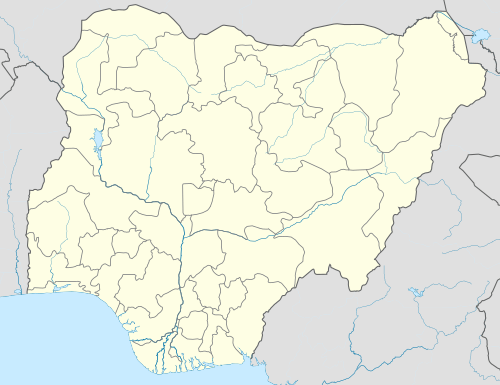Pategi
Patigi is a town in Kwara State, Nigeria. The town is the headquarters of Patigi Local Government and the Patigi Emirate. It is inhabited by the Nupe people who also exhibit a linguistic repertoire of the Yoruba dialect. They are farmers, aquatic sellers/fishers and traders. They are known to be governed by a monarch.
Patigi | |
|---|---|
Town | |
| Nickname(s): Paris | |
| Motto(s): mayin lo, mayin lo, ezhi patigi [the best place to be is patigi] | |
 Patigi Location in Nigeria | |
| Coordinates: 8°44′N 5°45′E | |
| Country | |
| State | Kwara State |
| Government | |
| • Etsu | etsu alhaji Umar Bologi II.[1] |
| Time zone | UTC+1 (WAT) |
Currently, a new Monarch, in the person of Umar Bologi II, was appointed, by the Government of the State, who happened to be a custom officer in before his appointment to the Office as the leader of Etsu Community.[2]
Settlement
Patigi is a Nupe town along the banks of the Niger River. The township is located within Patigi Local Government Area. The local government is one of the largest Fadama lowlands in the state with River Niger as the primary source of water.[3]
The people
The Nupe people of Patigi are majorly farmers- harvesting cassava, millet, rice, guinea corn, melon. They also make a lot of local snacks such as "efan", "gbankuru", "liala", Kuli-kuli, "dankuwa" "banbara", "alewa" etc. The people of Patigi also engage in fishing. They are also very industrious.
History
The settlement of Patigi had existed before the founding of Pategi Emirate but the growth and importance of Patigi grew as a result of the movement of the Edegi ruling house from Gbara and Bida to Patigi forming a new emirate.[4]
Pategi Emirate
The history of the town is linked with the history of Pategi Emirate. The emirate's formation came as a result of the British conquest of Bida.
Bida was originally the home of the Tsoede Nupe dynasty. However, in 1857, Mallan Dendo who was a Fulani itinerant preacher and a follower of Uthman Dan Fodio and his followers dislodged the Nupe rulers who were already split into factions and established a Fulani emirate.[5] However, there were intermittent opposition by some indigenous or Nupe groups to the rule of Dendo descendants in Bida.[5] Among these rebel groups was the Yissazzhi faction, originally led by Jimada a claimant to the Bida throne prior to the Fulani dynasty of 1857[5] and in 1897, by Idrissu Gana. They had reluctantly supported the Fulani Emir of Bida in battles against other indigenous rebel groups but when the British waged was against the Fulani emirate of Bida, the group laid down their arms and refused to join Bida.[5] After the British conquest, the Yissazhi under Idrissu Gana were allowed to have their own emirate at Patigi.
During colonial rule, Pategi was a district within Ilorin province and it is the location of the first successful mission of the Sudan Interior Mission.
Regatta
Patigi hosts a boat Pategi Regatta Festival on the terrain of the Niger River. In a paper by late Prof. Idrees Aliyu A. "The Patigi Regatta Festival: its origin, historical significance and tourism prospects"; the idea of the Patigi Regatta Festival was conceived in 1950 by the traditional Council of Patigi Emirate under the leadership of Etsu Umaru Bologi and Ahman Pategi, and was inaugurated in 1953. It is a biennial event involving the people of Patigi Emirate and residents living along the banks of the Niger in Kwara, Niger and Kogi states. The main part of the festival consists of canoe races and displays on the Niger at Gbaradogi on the west bank; the second part of the festival takes place in the palace of the Etsu of Patigi and involves a variety of Nupe cultural displays. The festival attracts many tourists from far and wide.
References
- "Etsu Patigi: 38-yr-old monarch unveils plans for community". National Pilot Newspaper. Retrieved 2020-02-24.
- Ahmad, Romoke W.; Ilorin (2019-05-15). "New Etsu Patigi seeks for support". Daily Trust. Retrieved 2020-02-24.
- "Patigi".
- https://allafrica.com/stories/201501080267.html The pategi Kwara
- Idrees, Aliyu (1989). "Collaboration and the British Conquest of Bida in 1798: The Role and Achievement of the Indigenous Interest Groups". African Study Monographs. The Center for African Area Studies, Kyoto University. 10 (2). Retrieved 27 July 2016.
Further reading
- Ewald, Janet (1975). The River Niger and River People in Nupe (MA Thesis), University of Wisconsin, Madison.
- Madaki, Muhammad Baba (2004). Fulani Dynasty in Nupe Kingdom. Minna: Diamond Publishers.
- Wasabi, Alhassan (2002). Counting in Nupe Language. Minna: Ajiboye Printers Ltd
